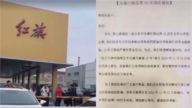【新唐人2015年01月08日訊】深圳最大的房地產開發商佳兆業集團控股有限公司,日前爆發貸款違約,金額達5200萬美元。據了解,這是中國2015年第一宗企業融資違約案。有分析指出,佳兆業集團的違約,有可能成為中國房地產崩盤的先兆。
佳兆業集團是深圳的土龍頭房企,於2009年12月在香港交易所上市。去年上半年,佳兆業以16.7萬平方米,1801套房產的成交量、41億元人民幣的成交金額,一舉超過中國房企龍頭萬科在深圳的業績,摘下深圳樓市成交量、成交金額的雙料冠軍。
然而,讓人意外的是,這樣一家頂著靚麗業績頭銜的企業,在短短半年時間,就爆出了貸款違約消息。
據了解,事件起因於佳兆業前董事會主席郭英成的離職事件。佳兆業在2013年8月,與香港匯豐銀行簽定的4億港元(約5200萬美元)的貸款合約中載明,一旦郭英成離職,佳兆業應在離職生效當天,償還所有的貸款及利息。
郭英成的離職案在去年12月31號正式生效,但佳兆業卻在今年1月1號晚間宣佈,無法償還這筆5200萬美元的貸款。
佳兆業集團在提交給香港交易所的報告中坦承,這次違約可能對公司的財務狀況造成重大不利影響,公司其他貸款融資及所發行的債券和股本證券,也可能受到影響。
北京師範大學MBA導師、經濟專欄作家段紹譯指出,在未來一年內,大陸可能每天都會出現房企貸款違約事件。
段紹譯:「過去的幾年,房地產泡沫很嚴重,在暴利的驅使下,使很多的老闆,就高成本去融資,盲目去擴張,但沒想到現在這個情況急轉直下,使很多的房地產老闆變成沒有利潤,或者是國家收縮銀根,造成很多的企業資金鏈斷裂。深圳這個案子只是一個開始,在未來一年內,每個星期都可能會出現這樣的現象,甚至每天都會出現這樣的現象。」
據《華爾街日報》報導,佳兆業集團的離岸債券價格1月2號大幅下跌,債券收益率被推升至50%以上,而集團股票也從去年12月停牌至今。
報導說,穆迪投資者服務公司(Moody’s Investors Service)近日下調佳兆業的信用評級,標準普爾也在去年12月,對佳兆業的前景發出了警告。
時政評論員伍凡:「關鍵在於市場上的房子太多了,從2011年以來,已經蓋好的房子有20億平方米,可是市場上只需要12億,那你多出8億了,可是現在還在開工60億,所以就造成普遍的房地產公司要倒閉,深圳這個公司在2015年打了頭炮,恐怕今年有一系列的倒閉現象會發生。」
有關郭英成離職的原因,至今尚不明朗,不過外界認為,與反腐不無牽連。去年10月,深圳市委原常委、政法委書記蔣尊玉和郭英成,一前一後被有關部門帶走。去年11月,深圳市政府有關部門叫停佳兆業在深圳所有的房地產專案項目,數量高達上千套樓盤。
段紹譯:「確實中國官商勾結是很嚴重的,一旦企業涉入政府的貪腐案,它肯定會受到一些牽連,一些損失,尤其綜合實力不是很好的企業,有一點風吹草動都可能使這個企業面臨滅頂之災。」
不過,時政評論員伍凡認為,房地產開發商倒閉的根本原因在於市場因素。
伍凡:「里面有沒有貪污腐敗,有,但是在前幾年或10幾年前,當你房地產火火熱熱的時候,把所有貪污的事情掩蓋起來了,現在你還不出錢來,那麼貪污事情就曝光了。再加上現在反貪,中紀委抓人,市委書記、市長恐怕也涉及在裏頭。這種我覺得不是大原因,最根本的原因是市場造成的。」
伍凡表示,除了大陸房地產行業嚴重的供過於求,房子賣不出去外,還有一個國際因素,就是美元升值,強勢美元會使得大陸房企的債務成本增加。因此,伍凡預測,大陸的房地產開發商,今年會非常慘,中國的房地產甚至可能走向崩潰。
採訪/易如 編輯/陳潔
China’s First Property Loan Default, 2015: Kaisa Group
Shenzhen’s largest real estate developer Kaisa Group
has defaulted on a $52-million loan, the first in 2015.
It’s believed to indicate China’s real estate collapse this year.
Kaisa Group Holdings was listed on the Hong Kong
Stock Exchange in Dec. 2009.
In the first half of 2014, it replaced the leading real estate
developer, China Vanke, in position in Shenzhen
with its volume of sales and turnover.
Kaisa topped the Shenzhen market with a total of 1,801
real estate sales, worth 4.1-billion yuan.
just six months after its outstanding performance,
Kaisa defaulted on its loan payment.
Kaisa Chairman, Kwok Ying Shing’s departure
from the company is believed to be the cause.
The loan taken from HSBC for approximately US$51-million
(400-million HK dollars) in Aug. 2013 was due to be repaid
with interest on Dec. 31, 2014—the day Kwok resigned.
Kaisa announced the default on the evening of Jan. 1, 2015.
In a report to the Hong Kong Stock Exchange, Kaisa admitted
that the breach could have an adverse effect on the security
of the company’s finance, other loans, bonds and equity.
Economist Duan Shaoyi anticipates that defaults on loan
repayments are likely to occur regularly in China in 2015.
Duan Shaoyi: “The real estate bubble has been very serious
over the past years; driven by profit, owners blindly
expanded their businesses at high cost, but the sharp
downturn in the housing market has left many without profit
and the dwindling money supply from the state has resulted
in a breakage in the chain of funds."
“This case in Shenzhen is just a beginning—in 2015,
similar cases may emerge weekly, or even daily."
The Wall Street Journal (WSJ) reported the market value
of Kaisa halving since problems started a month ago.
Its stock trading was suspended in December.
Rating agency, Moody’s Investors Service last week
downgraded the company’s credit ratings, reported WSJ.
Standard & Poor’s also issued a warning
on Kaisa’s potential default in December.
Wu Fan, Current Affairs Commentator: “The key issue is that
there are too many houses on the market."
“Since 2011, as much as two-billion square-meters of
property is available, but market needs are only 1.2-billion."
“On top of the excessive 0.8-billion, another six-billion
square-meters of property is under construction."
“The property industry’s closure is going to be widespread;
Shenzhen took the first hit in 2015, and more is inevitable."
The reason for Kwok Ying Shing’s resignation is unclear, but
is generally believed to be linked to the anti-graft campaign.
Last October, Jiang Zunyu, the former secretary of
Shenzhen’s Politics and Law Commission, and Kwok were
respectively taken away by authorities.
In November, the Shenzhen government halted all of Kaisa’s
projects, involving thousands of sets of real estate.
Duan Shaoyi: “Collusion in China is really very serious;
once a company is involved in a corruption case,
it will certainly suffer losses, and for a weak business,
any sign of trouble can cause it to shut down."
Wu Fan believes market factors are the cause of failure
for real estate developers.
Wu Fan: “Is corruption involved? Yes—when real estate
was thriving a few years ago, or a decade ago,
the corruption was covered up, but now it has been exposed
because the loan is defaulted."
“The anti-graft campaign especially has implicated many,
including the Party secretary or mayor."
“But I don’t think it’s the main reason for failure—
the market is the reason."
Wu Fan says that in addition to the serious over-supply
in the property sector, there is also an international factor
involved—the appreciation of the dollar, as a strong dollar
increases the cost of debt in housing.
Wu Fan anticipates the property industry in China
to have a tough time in 2015 and even collapse.
Interview/YiRu Edit/ChenJie






























